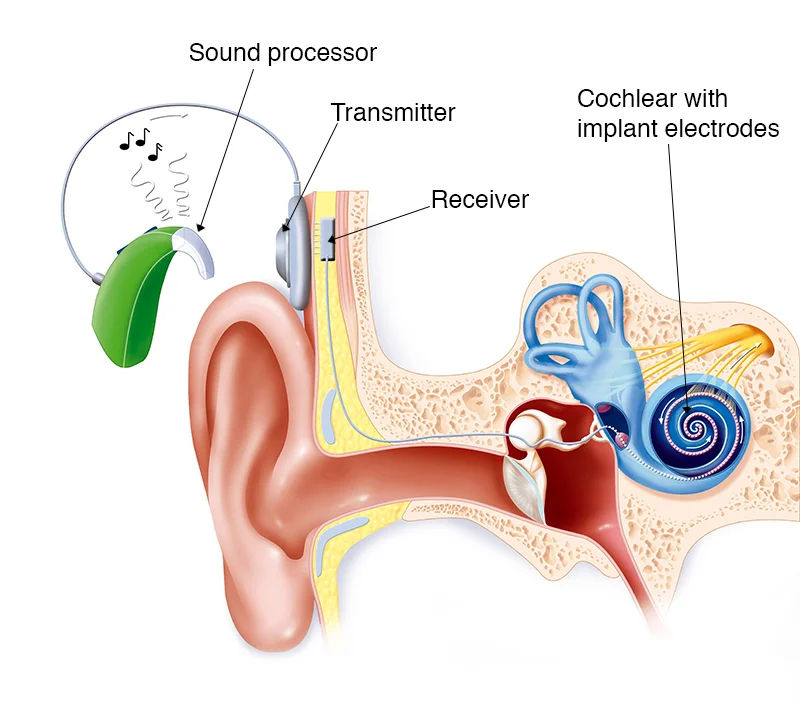
A cochlear implant is a medical device designed to provide a sense of sound to individuals with severe to profound hearing loss. It is primarily used for individuals who do not benefit from conventional hearing aids. Unlike hearing aids, which amplify sound, cochlear implants bypass damaged portions of the ear and directly stimulate the auditory nerve to send signals to the brain, enabling the perception of sound.
Why is Cochlear implant surgery done?
Cochlear implants can improve their communication and quality of life. Adults of any age and children who are as young as 6 to 12 months old can benefit from cochlear implants.
People who have cochlear implants report improved:
- Ability to hear speech without needing visual cues such as reading lips
- Recognition of everyday environmental sounds
- Ability to listen in a noisy environment
- Ability to find where sounds are coming from
- Ability to hear television programs, music and telephone conversations
- Symptoms of ringing or buzzing (tinnitus) in the implanted ear
To be eligible for a cochlear implant, you must have:
- Hearing loss that interrupts spoken communication
- Limited benefit from hearing aids as determined by specialized hearing tests
- Motivation to participate in hearing rehabilitation and be part of the hearing world
- Realistic expectations of what cochlear implants can and can't do for hearing
How does Cochlear Implant work
The cochlear implant system consists of two main components: an external portion and an internal portion. The external component, worn behind the ear, captures and processes sound from the environment. It includes a microphone, a speech processor, and a transmitter. The speech processor analyzes sounds and converts them into electrical signals that are transmitted to the internal component..
The internal component is surgically implanted under the skin behind the ear. It comprises a receiver-stimulator and an electrode array. The electrode array is inserted into the cochlea, which is the spiral-shaped structure of the inner ear responsible for hearing. The electrodes of the array stimulate the auditory nerve fibers, bypassing damaged hair cells, and transmit signals to the brain.
How is Cochlear implant surgery done?
Cochlear implant surgery is an outpatient procedure. You’ll receive general anesthesia before surgery. Your surgeon then:
- Makes a small incision behind your ear to insert the implant.
- Creates an opening in the bone behind your ear that connects to your cochlea.
- Uses the opening to place the electrodes on the end of the implant that connect the cochlea to the transmitter.
- Uses sutures to close the incision behind your ear.
Hearing is a learned behavior. If you have hearing loss, your brain needs to relearn how to process sounds. Most people with cochlear implants work with an audiologist or a speech-language pathologist (SLP) to help their brains understand what sounds mean. Patients need to be committed to doing auditory-based relearning to optimize the benefit.
What are the benefits of Cochlear implants?
Cochlear implant surgery offers several significant benefits for individuals with severe to profound hearing loss who do not receive adequate benefit from hearing aids. Here are some of the key advantages of cochlear implant surgery:
- Cochlear implants can provide a significant improvement in hearing ability for individuals with severe to profound hearing loss.
- Cochlear implants can help individuals understand speech more clearly, even in challenging listening situations. They can improve the ability to distinguish speech sounds, recognize voices, and understand conversations, both in quiet and noisy environments.
- Cochlear implants open up new communication options for individuals with severe hearing loss.
- For children with hearing loss, cochlear implant surgery at an early age can facilitate the development of listening and speaking skills.
- Cochlear implants can provide access to a wide range of sounds, allowing individuals to enjoy music, appreciate environmental sounds, and experience the nuances of everyday auditory experiences that they may have been missing previously.
- Cochlear implants offer long-term benefits, as they are designed to be long-lasting and can provide improved hearing for many years.
Frequently Asked Questions
-
What are the risk associated with cochlear implant surgery?
All surgeries come with risk, including risks associated with general anesthesia and infection. Other risks might include nerve damage, meningitis, fluid leaks, vertigo and tinnitus.
- How do I wear a sound processor??
There are two styles of processors. One style sits on your ear with a cable that attaches to a disc on the side of your head. Another style attaches to the side of your head and doesn’t require an ear unit.
- How long will it take before my hearing improves?
It may take some time before you notice a big change for the better. That’s because your brain needs time to get used to receiving information from your hearing nerve. In general, people’s hearing improves about a month after their implant is activated
- What does noise sound like with a cochlear implant?
You may notice that what you hear sounds different from what you remember. At first, what you hear may sound artificial or mechanical.
- How do I wear a sound processor??
-
What can I do to make cochlear implants help my hearing?
- Use the implant consistently: That means wearing the external processor while you’re awake.
- Participate in therapy: Your brain is relearning how to interpret signals. Participating in therapy helps that process.
- Connect with other people who have cochlear implants.
-
Do cochlear implants affect my brain?
No, they don’t. Cochlear implant surgery isn’t brain surgery. The electrodes in your cochlea send signals to your brain, but they don’t connect with your brain in a way that affects it.
-
When should I contact the doctor?
You should contact your provider if you notice hearing changes or you have ear pain or discomfort in your ears.
